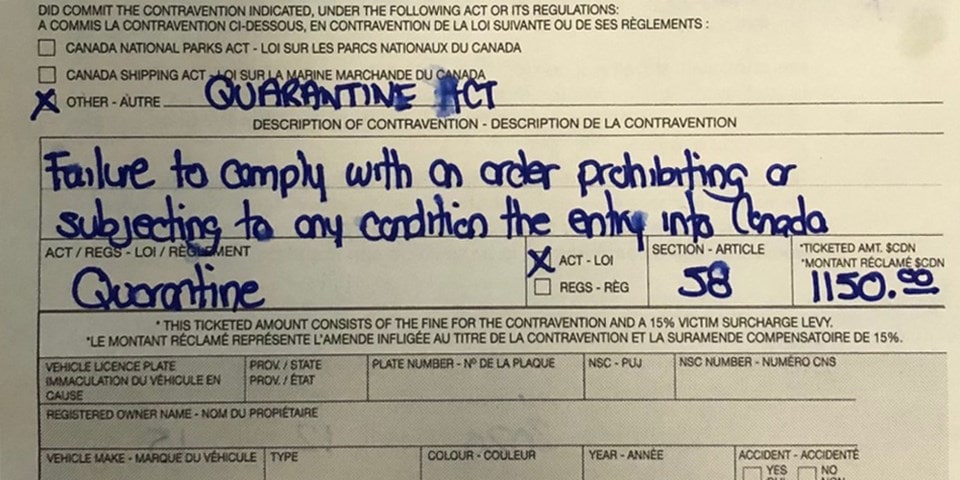DESIBUZZCanada
Events Listings
Dummy Post

International Day Of Yoga To Be Virtually Celebrated Saturday At 4pm

CANCELLED: Coronavirus Fears Kills Surrey’s Vaisakhi Day Parade

ADVERTISE WITH US: DESIBUZZCanada Is The Most Read South Asian Publication Online

SURREY LIBRARIES: Get Technology Help At Surrey Libraries

WALLY OPPAL: Surrey Police Transition Update On Feb. 26

GONE ARE THE DAYS - Feature Documentary Trailer

Technology Help At Surrey Libraries

Birding Walks

Plea Poetry/short Story : Youth Contest

International Folk Dancing Drop-in Sessions
COVID-19 Law Breakers Will Have To Pay Fines If They Don’t Want To Lose Their Driver’s Licenses
- June 17, 2021

If passed, proposed amendments to the Motor Vehicle Act will extend "refuse to issue" (RTI) restrictions to fines issued under the Emergency Program Act and COVID-19 Related Measures Act. RTI will apply to all outstanding fines issued under these acts and will be applied retroactively. People with outstanding fines will receive notice of the RTI from ICBC ahead of their driver's licence expiry and vehicle license renewal. These amendments will come into force on July 1, 2021.
By DESIBUZZCanada Staff
VICTORIA - People who leave COVID-19 fines unpaid may be unable to obtain or renew a B.C. driver's licence or vehicle licence under proposed legislation introduced recently.
"That small minority of persons who have been fined for violating the rules in place to protect us all are going to be held accountable for the debt they owe," said Mike Farnworth, Minister of Public Safety and Solicitor General. "We've already moved up the deadline for sending unpaid COVID-19 fines to collections. Now, we're going to refuse to issue offenders a driver's licence or vehicle licence if they still won't take their tickets seriously and pay up."
If passed, proposed amendments to the Motor Vehicle Act will extend "refuse to issue" (RTI) restrictions to fines issued under the Emergency Program Act and COVID-19 Related Measures Act. RTI will apply to all outstanding fines issued under these acts and will be applied retroactively. People with outstanding fines will receive notice of the RTI from ICBC ahead of their driver's licence expiry and vehicle license renewal. These amendments will come into force on July 1, 2021.
British Columbians will still have payment options available to them:
* People with COVID-19 fines are able to request the court lower the fine if they lack the means to pay.
* Repayment arrangements can be requested and will be considered by ICBC depending on financial and hardship needs.
* RTI decisions can also be appealed to the superintendent of motor vehicles to be reviewed on any grounds including hardship.
Currently, RTI applies to various statutes such as the Motor Vehicle Act and the Liquor Control and Licensing Act. To obtain relief, a debtor must pay their outstanding fines in full or establish a suitable repayment arrangement.
In December 2020, the government instructed ICBC to begin sending unpaid COVID-19 fines to a collection agency after 30 days when the dispute period has ended or the courts have confirmed guilt. Other unpaid violation ticket files typically go to collections after 12 months.
Quick Facts:
* The total amount of the 1,679 violation tickets processed by ICBC as of May 8, 2021, is $1,179,980. Only $172,825, or 14% of the total, has been paid.
* Since March 2020, when the government originally declared what has become B.C.'s longest state of emergency, numerous public health orders and restrictions have been put into place to stem the spread of COVID-19.
* The Motor Vehicle Act allows ICBC to refuse to issue driver's license and vehicle licences to people indebted to government due to their failure to pay a fine under specific statutes, including the Motor Vehicle related Criminal Code of Canada offences, the Commercial Transport Act, the Passenger Transportation Act and the Liquor Control and Licensing Act.
- Drivers may appeal an RTI decision through the superintendent of motor vehicles.


















